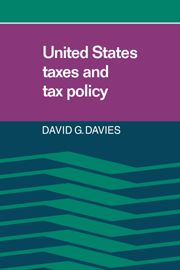Book contents
- Frontmatter
- Contents
- Preface
- 1 Economic foundations of U.S. tax policy
- 2 The individual income tax
- 3 Economic effects of individual income taxes and inflation
- 4 Expenditure versus income taxation
- 5 The taxation of capital gains
- 6 The corporation income tax
- 7 The corporation income tax and inflation
- 8 Social security payroll taxes
- 9 The value added tax
- 10 The sales tax
- 11 State taxes
- 12 Local government taxes
- 13 The distribution of tax burdens
- 14 Status of U.S. taxes and policy
- Appendix
- References
- Index
- Frontmatter
- Contents
- Preface
- 1 Economic foundations of U.S. tax policy
- 2 The individual income tax
- 3 Economic effects of individual income taxes and inflation
- 4 Expenditure versus income taxation
- 5 The taxation of capital gains
- 6 The corporation income tax
- 7 The corporation income tax and inflation
- 8 Social security payroll taxes
- 9 The value added tax
- 10 The sales tax
- 11 State taxes
- 12 Local government taxes
- 13 The distribution of tax burdens
- 14 Status of U.S. taxes and policy
- Appendix
- References
- Index
Summary
The state-local sector is the most dynamic and experimental in the use of taxes in our federal system. Since World War II, state-local tax revenues have grown more rapidly than those of the federal government. Furthermore, these governments have led the way in trying out such diverse revenue devices as lotteries, user fees, and constitutional limits on the level of taxation (Courant, Gramlich, and Rubenfeld 1980:8–20).
Reasons for growth in state-local taxes
There are several reasons for the relative growth of the state-local government sector of the economy. These factors help account for an increasing decentralization of financial affairs in federal countries since the end of World War II. A discussion of several of the factors pushing up state-local taxes follows (Davies 1977:65–82):
1. State-local governments in a federally structured country are originally assigned and tend to keep a wide variety of government functions that require resources for their fulfillment. The important areas of education, highways, health, welfare, and fire and police protection illustrate important responsibilities that are often assigned to state-local governments by constitutional authority. State-local jurisdictions will grow more rapidly than central governments if the income elasticity of demand for their services increases more rapidly than it does for federal programs. This factor has been operative in most countries since the end of World War II. Large increases in population and its density have fostered strong and increasing demands for precisely those goods and services that state-local governments provide.
- Type
- Chapter
- Information
- United States Taxes and Tax Policy , pp. 229 - 250Publisher: Cambridge University PressPrint publication year: 1986

